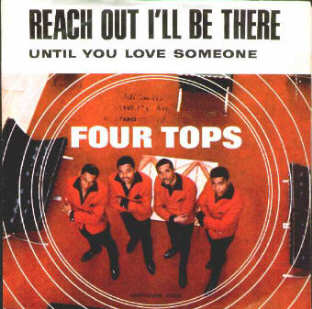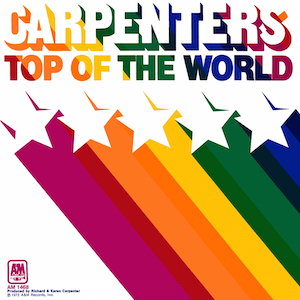"Mack the Knife" or "The Ballad of Mack the Knife" is a song composed by Kurt Weill with lyrics by Bertolt Brecht for their 1928 music drama The Threepenny Opera. The song tells of a knife-wielding criminal of the London underworld from the musical named Macheath, the "Mack the Knife" of the title.

"Baby I Need Your Loving" is a 1964 hit single recorded by the Four Tops for the Motown label. Written and produced by Motown's main production team Holland–Dozier–Holland, the song was the group's first Motown single and their first pop Top 20 hit, making it to number 11 on the US Billboard Hot 100 and number four in Canada in the fall of 1964. It was also their first million-selling hit single.

"Reach Out I'll Be There" (also formatted as "Reach Out (I'll Be There)") is a song recorded by American vocal quartet Four Tops from their fourth studio album, Reach Out (1967). Written and produced by Motown's main production team, Holland–Dozier–Holland, the song is one of the most widely-known Motown hits of the 1960s and is today considered the Four Tops' signature song.
"Always on My Mind" is a ballad written by Wayne Carson, Johnny Christopher, and Mark James, first recorded by Brenda Lee and first released by Gwen McCrae in March 1972. Lee's version was released three months later in June 1972. The song has been a crossover hit, charting in both the country and western and pop categories. Elvis Presley's recording was the first commercially successful version of the song.

"Top of the World" is a 1972 song written and composed by Richard Carpenter and John Bettis and first recorded by American pop duo Carpenters. It was a Billboard Hot 100 No. 1 hit for the duo for two consecutive weeks in 1973.
"Dream Lover" is a song written by American musician Bobby Darin. Darin recorded his composition on March 5, 1959 and released it as a single the following month. It was produced by Ahmet Ertegun and Jerry Wexler and engineered by Tom Dowd.

"Yesterday Once More", written by Richard Carpenter and John Bettis, is a hit song by the Carpenters from their 1973 album Now & Then. Thematically the song concerns reminiscing about songs of a generation gone by. It segues into a long medley, consisting of eight covers of 1960s tunes incorporated into a faux oldies radio program. The work takes up the entire B-side of the album.

"Break It to Me Gently" is a pop song written by blues musician Joe Seneca with lyrics by Diane Lampert. Both Brenda Lee and Juice Newton were met with considerable success with their versions of the song.
"Reason to Believe" is a song written, composed, and first recorded by American folk singer Tim Hardin in 1965. It has since been recorded by many artists, most notably by the Carpenters in 1970, and Rod Stewart in 1971 and 1993.

"Da Doo Ron Ron (When He Walked Me Home)" is a song written by Jeff Barry, Ellie Greenwich and Phil Spector. It first became a popular top five hit single for the American girl group the Crystals in 1963. American teen idol Shaun Cassidy recorded the song in 1977 and his version hit number one on the Billboard Hot 100 chart. There have also been many other cover versions of this song, including one by the songwriters Jeff Barry and Ellie Greenwich themselves, performing as the Raindrops.

"Mr. Lonely" is a song co-written and recorded by American singer Bobby Vinton, backed by Robert Mersey and his Orchestra. The song was first released on Vinton's 1962 album, Roses Are Red.

"Song Sung Blue" is a 1972 hit song written and recorded by Neil Diamond, inspired by the second movement of Mozart's Piano Concerto #21. It was released on Diamond's album Moods, and later appeared on many of Diamond's live and compilation albums. The song was a #1 hit on the Billboard Hot 100 chart in the United States for one week, the week of July 1, and it spent twelve weeks in the Top 40. It also reached #14 on the UK Singles Chart.
"How Can We Hang On to a Dream" is a song composed and recorded by Tim Hardin. It was Hardin's first single after he signed with Verve Folkways, released around six months before his debut album Tim Hardin 1. The single was titled "Hang On to a Dream" in some territories.

If I Were a Carpenter is an album by American singer Bobby Darin, released in 1966. It was a significant change in direction for Darin considering his previous album was a collection of show tunes.

"Black Is Black" is a song by the Spanish rock band Los Bravos, released in 1966 as the group's debut single for Decca Records. Produced by Ivor Raymonde, it reached number two in the UK, number four in the US, and number one in Canada. With the recording's success, Los Bravos became the first Spanish rock band to have an international hit single. A dance remix was released as a single in 1986.
"A Thing Called Love" is a song written and originally recorded by Jerry Reed in 1968. This song has been recorded by many artists, including Jimmy Dean, Elvis Presley, Glen Campbell, and Dave Dudley. In 1971, the song was recorded by Johnny Cash and it became a No. 1 country hit in Canada. The record was Cash's biggest hit in Europe, charting in Ireland, the United Kingdom, and the Netherlands. Presley's version features The Imperials on backing vocals and is an uncredited duet with their bass singer Armond Morales; it was also recorded in 1971 and was released on his third and final gospel album, He Touched Me in 1972.
"With Pen in Hand" is a song written by Bobby Goldsboro and first released on his March 1968 album, Honey. The song's lyrics address the subjects of divorce and losing custody of one's child, and are sung from the perspective of the parent who expects to be losing custody of their child, as they make a final plea to their spouse to reconcile before the divorce is finalized. "With Pen in Hand" has been a hit for multiple artists in the late 1960 and 1970s.

"Makin' Love" is a song written and originally released by American country singer Floyd Robinson. He released it as a single in 1959 and was featured on his self-titled debut album the following year.
"He Understands Me" is a song released in 1963 by Teresa Brewer. The song was a hit single for Johnny Tillotson in 1964, retitled "She Understands Me", and Bobby Vinton in 1966, retitled "Dum-De-Da".
"The Lady Came from Baltimore" is a song written by American singer-songwriter Tim Hardin, who recorded and released it as a track on his album Tim Hardin 2 in 1967. The song was inspired by Hardin's relationship with his wife, Susan Yardley Morss, who acted under the name Susan Yardley and who came from a prosperous family in Baltimore who disapproved of the relationship; Hardin's lyrics refer to "Susan Moore".
















